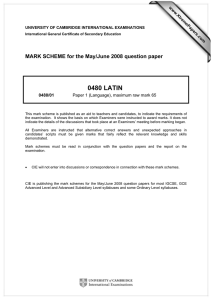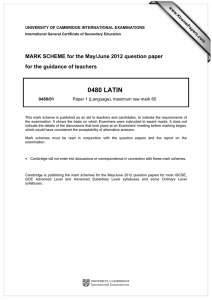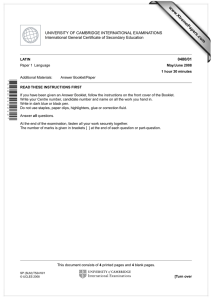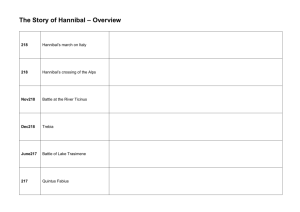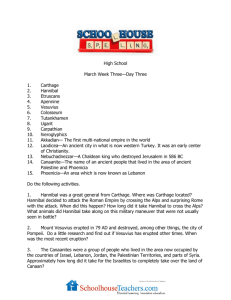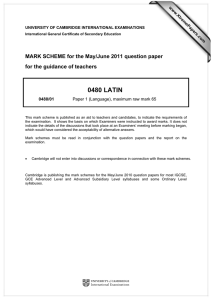0480 LATIN MARK SCHEME for the May/June 2013 series
advertisement
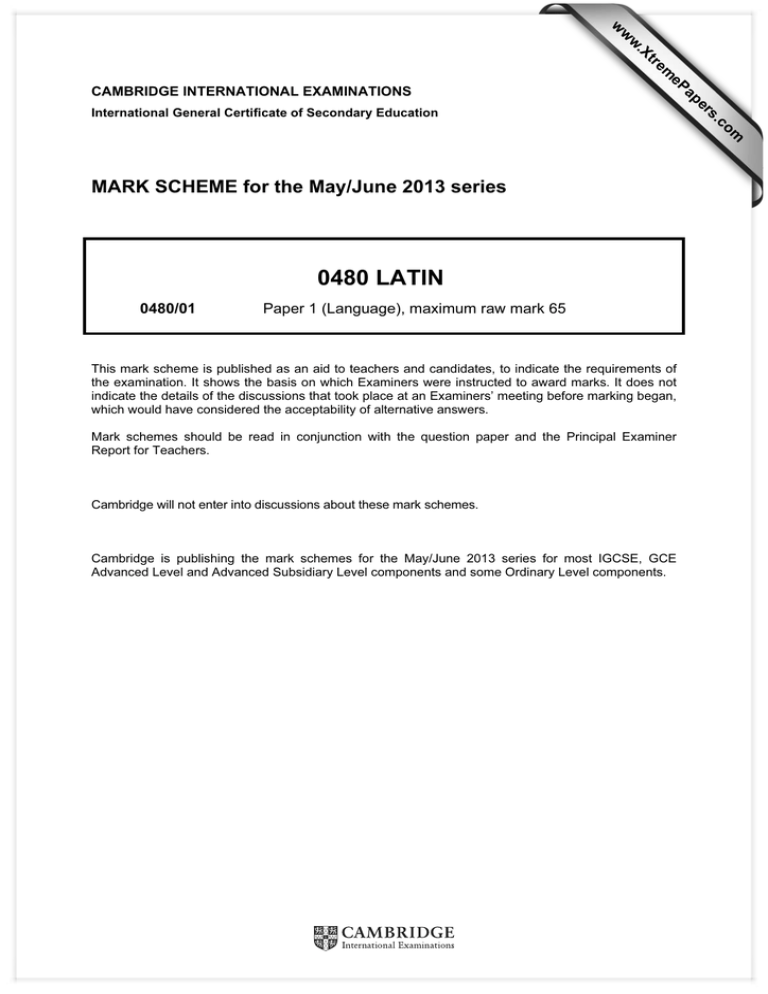
w w ap eP m e tr .X w CAMBRIDGE INTERNATIONAL EXAMINATIONS 0480 LATIN 0480/01 Paper 1 (Language), maximum raw mark 65 This mark scheme is published as an aid to teachers and candidates, to indicate the requirements of the examination. It shows the basis on which Examiners were instructed to award marks. It does not indicate the details of the discussions that took place at an Examiners’ meeting before marking began, which would have considered the acceptability of alternative answers. Mark schemes should be read in conjunction with the question paper and the Principal Examiner Report for Teachers. Cambridge will not enter into discussions about these mark schemes. Cambridge is publishing the mark schemes for the May/June 2013 series for most IGCSE, GCE Advanced Level and Advanced Subsidiary Level components and some Ordinary Level components. om .c MARK SCHEME for the May/June 2013 series s er International General Certificate of Secondary Education Page 2 Mark Scheme IGCSE – May/June 2013 Syllabus 0480 Paper 01 SECTION A (Hannibal) nautas (1) tali (1) modo (1) hortatus (2) iussit (2) classem (1) in proelium (1) navigare (2) sed (1) priusquam (1) signum (1) pugnae (1) daretur (2) (Hannibal) ut (1) cognosceret (2) quo (1) loco (1) (Eumenes) esset (2) tabellarium (1) in (scapha) (1) cum (caduceo) (1) misit (2) qui (1) ubi (1) ad naves (1) hostium (1) pervenit (2) epistulam (1) ostendens (2) nuntiavit (2) se (1) regem (1) quaerere (2) (et) statim (1) ad Eumenem (1) ductus est (2) nam (1) omnes (1) crediderunt (2) tabellarium (1) epistulam (1) de pace (1) scriptam (2) portare (2) (tabellarius) nave (1) regis(1) suis (1) patefacta (1+1) ad eundem (1) locum (1) unde (1) profectus erat (2) regressus est (2) at(1) (Eumenes) nihil (1) in (1) aperta (1) epistula (1) invenit (2) nisi (1) quae (1) ad eum (1) deridendum (2+1) pertinerent (1) itaque (1) statim (1) proelium (1) commisit (2) in primo (1) concursu (1) (Hannibal) (Bithyniis) imperavit (2) ut (1) omnes (1) navem (1) Eumenis (1) oppugnarent (2) rex (1) cum (1) eorum (1) impetum (1) sustinere (2) non (1) posset (2) ad castra (1) sua (1) quae(1) in litore (1) proximo (1) erant(2) fugit (2) (Bithynii) autem (1) cum (1) reliquis (1) Pergamenorum (1) navibus (1) superarentur (2) in hostium (1) naves (1)vasa fictilia (1) inicere (2) coeperunt (2) primo (1) (Pergameni) ridebant (2) sed(1) postquam (1) serpentes (1) e vasis (1) exeuntes (2) conspexerunt (2) tam (1) perterriti (1) erant (2) ut (1) ipsi (1) quoque (1) effugerint (2) sic (1) (Hannibal) consiliis (1) callidissimis (2) vim(1) Pergamenorum (1) vicit (2) [11] [6] [7] [5] [9] [10] [11] [12] [14] *[5] [10] [9] [9] [7] [7] [3] [8] [9] [8] [Total: 160 divided by 4] Specimen Translation Hannibal, after encouraging/having encouraged the sailors in such a way, ordered the fleet to sail into battle. But before the signal for battle could be given, Hannibal, to find out where Eumenes was, sent a courier in a skiff with a flag of truce. He, when he reached the enemy ships, showing the letter, announced that he was looking for the king and at once was led to Eumenes. For everyone believed that the courier was carrying a letter written about peace. The courier, when the king’s ship had been revealed to his own side, returned to the same place from where he had set out. But Eumenes found nothing in the letter when it had been opened except for things which were suitable for making fun of him. And so he joined battle at once. In the first clash Hannibal ordered the Bithynians all to attack Eumenes’ ship. Since the king could not withstand their attack, he fled to his camp which was on the nearest shore. However, the Bithynians when they were being overpowered by the remaining Pergamene ships, began to throw earthenware jars onto the enemy ships. At first the Pergamenes laughed but, after they caught sight of snakes coming out of the jars, they were so frightened that they also fled. In this way Hannibal with very clever plans defeated the force of the Pergamenes. © Cambridge International Examinations 2013 Page 3 Mark Scheme IGCSE – May/June 2013 Syllabus 0480 Paper 01 SECTION B (a) Captured by (1) (Masinissa’s) cavalry (1) [2] (b) Capture (1) city (1) without (1) (long) siege (1) [4] (c) Huge (1) crowd (1) of men (1) women (1) children (1) had gathered (1). Any four [max 4] (d) Nothing (1) finer (1) than as (1) victor (1) to see homeland (1) again/after so long a time (1) [6] (e) Ordered (1) the leaders (1) (of the Cirtans) to come (1) to talks (1) [4] (f) [2] (i) Showed them Syphax (1) in chains (1) (ii) Opened the gates (1) at once (1) at so terrible a sight (1)/allowed Massinissa (1) (to come) into Cirta (1). Any two [max 2] (g) (i) Conspicuous (1) arms and clothes (1) [2] (ii) Ran up to him (1) (as he was entering the palace) grabbed his knees (1) [2] (h) Afraid (1) prefer/rather (1) to die/die (1) than (1) be given/be handed over (1) (to Romans) as captive (1) [6] (i) Won over (1) by her beauty/figure (and prime/age) (1) [2] (j) (i) Marry Sophoniba (1) straight away/that day (1) [2] (ii) She could not (1) be handed over/surrendered to the Romans (1) not just ‘given’ [2] (k) Drag her away (1) (along) with Syphax and other captives (1) [2] (l) He could keep (1) Sophoniba (1) OR Sophoniba (1) could stay in Cirta (1)/If he captured (1) more cities (1) [4] [sub-total 46, divided by 2 = 23] (m) E.g. equestrian, reiterate, temporal, prince, extract. Any two – 1 mark each [2] [Total: 25] *Round up any half marks after the subtotal is divided by two © Cambridge International Examinations 2013
